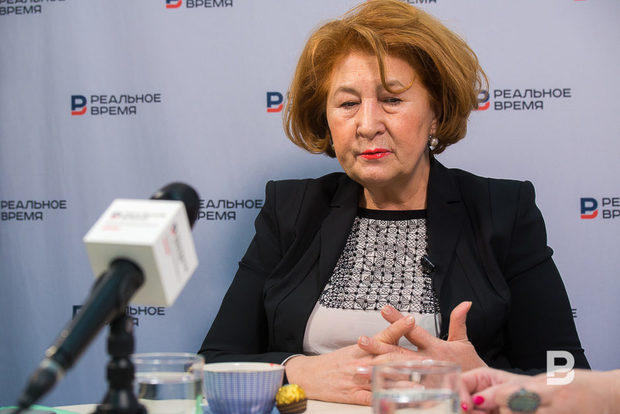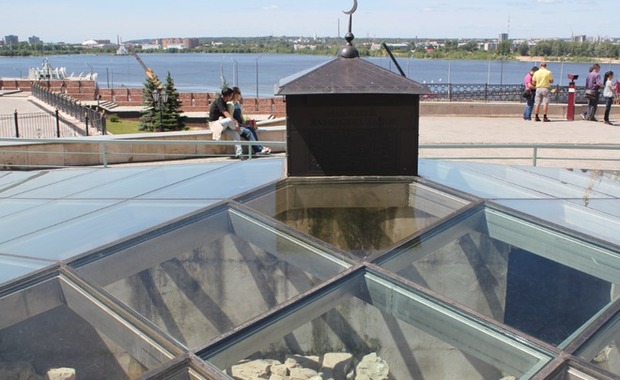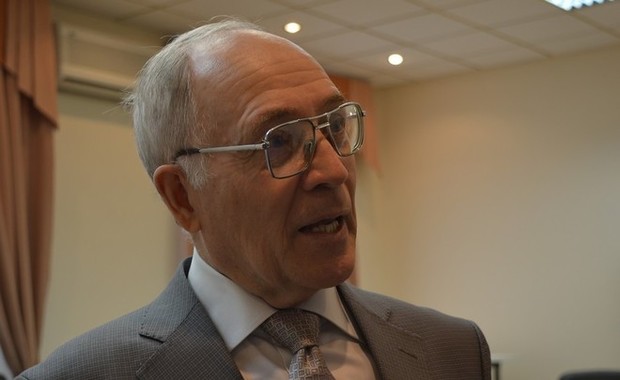Russian muftis bury Kazan khans for the second time before Ramadan
The question of burial of the remains of Genghis Khan’s descendants in the Kremlin, which was first raised by Realnoe Vremya, will be solved at 2017 KazanSummit
The question of the burial of two Kazan khans – Makhmud and Mukhammad-Amin, which was first raised by Realnoe Vremya newspaper, — will be solved on 19 May. An official burial ceremony with high-profile guests of Tatarstan is scheduled for this day. The remains will be brought to the mausoleum one week before the start of holy Ramadan month. The major debatable question on the second funeral prayer was also solved.
Date and ceremony have been known
Member of the Kazan Council of Elders Rauf Ibragimov told Realnoe Vremya that the reburial of the remains of Kazan khans will take place shortly before the holy Ramadan month, which will start on 27 May this year. Now the scheduled date is on 19 May. According to Ibragimov, the burial day was discussed at the level of the Council of Elders in the muftiate. Then there were several agreements:
''We usually visit Bolgar on 21 May. And guests from all Russia come to Kazan at this time. The burial will take place when we have many guests. I think it (Editor's Note: 19 May) is the final date because people will depart after 21 May – the moment will be lost.''
Rauf Ibragimov explained how the burial will look. As he said, the remains will be carried by hands from Qul Sharif Mosque to the burial site. They will be buried in the ground, a marble slab will be put on it.
As director general of Kazan Kremlin museum-reserve Zilya Valeyeva told Realnoe Vremya, the very mausoleum will have been prepared by the burial.

''We managed to restore the underground part of the mausoleum because it was said during the digs how the remains were located. Unfortunately, we did not manage to restore the upper part,'' Zilya Valeyeva tells. Photo: Maksim Platonov
''The consecration of the mausoleum will be held first. Russian muftis who will gather in Kazan for a meeting will participate there. After prayer at Qul Sharif Mosque, they will go towards the mausoleum. We managed to restore the underground part of the mausoleum because it was said during the digs how the remains were located. Unfortunately, we did not manage to restore the upper part. It was destroyed, and no description left,'' the head of Kazan Kremlin museum-reserve tells.
It should be noted the ceremony will take place within Russia – Islamic World: 2017 KazanSummit international economic summit, which will be in the capital of Tatarstan on 18-20 May.
To say requiem?
The debate whether to read requiem once again was an important question because of which the burial dragged on. Earlier Realnoe Vremya had a protocol of the meeting of the Tatarstan Muslim Spiritual Directorate at its disposal. It was about the organisation of the Kazan khans' reburial. Then theologians came to a conclusion that it would be wrong to say the second requiem because it was done during the first burial.
''There was a debate whether to say requiem again because when we bury the dead we say a prayer. When the khans were buried for the first time, this prayer was already said,'' says Rauf Ibragimov. ''It was not very clear whether we should read requiem for the second time during the second burial. It is an exception. As far as I am concerned, it was not considered by Sharia. Now we came to a conclusion that requiem will be said because 40 years have passed. And these bones visited many places – they were examined. It means it will be necessary to wash them again. One should read requiem while washing. I think no changes are expected in the procedure.''

Up in the air
The story with the Kazan khans' remains started 40 years ago. A group of archaeologists headed by Alfred Khalikov detected two tombs at the foot of Syuyumbike Tower. They had a wooden tomb with rich leather interior padded with silver plates each. The mausoleums located at the ''Kremlin hill'' were destroyed after the conquer of Kazan by Ivan The Terrible, but the tombs did not suffer. The skeletons that were found there were sent to the Institute of History of the Tatarstan Academy of Sciences. Later, the bones were kept in the Khalikov Institute of Archaeology of the Tatarstan Academy of Sciences, which separated.
Only 20 years later it was announced one of the graves belongs to the son Golden Horde's ruler, Kazan Khan Makhmud who died in 1467 and the other one – to Ibragim Khan's son, Khan Mukhammad-Amin who died in 1518. Scientists came to these conclusions through a comparative analysis of the data of historical sources and information of the anthropological research.
The second stage of digs headed by director general on development of the Institute of Archaeology of the Tatarstan Academy of Sciences, Doctor of Historical Sciences Fayaz Khuzin started in the 2004-2005s. Another four graves were found then. In his interview to Realnoe Vremya, Khuzin noted the found remains were cared for and treated as holy relics (many people questioned the state of the founding).

A real discussion came about whether it was necessary to rebury them. Kazan khans were a forbidden topic during the Soviet years. And people returned to it much time later. When the muftiate, Institute of Archaeology agreed that the remains need to be reburied, a question of the very procedure arose. For instance, director of the Mardjani Institute of History of the Tatarstan Academy of Sciences Rafael Khakimov said the reburial was postponed due to an unsolved problem on the burial procedure. There was not a common opinion – whether to read requiem or not.
In June 2016, the Tatarstan Muslim Spiritual Directorate claimed the khans' remains would be reburied in October. However, then it was rumoured that the reburial could be postponed to May 2017 because of debates on customs. The problem of the remains was solved neither in October nor months later. It was even presupposed that they decided not to rebury them. But in January 2017, in an interview to Realnoe Vremya, director general of Kazan Kremlin museum-reserve Zilya Valeyeva told at least the museum did not refuse the idea and was going to rebury the Kazan khans.